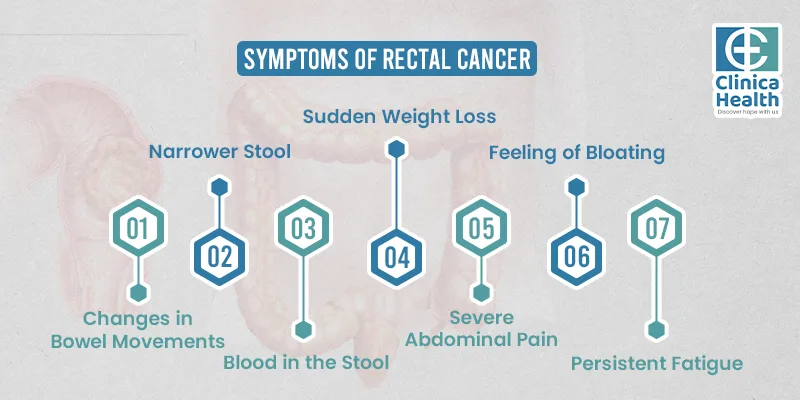-
 Call Now:
8010 552 552
7595 838 844
Call Now:
8010 552 552
7595 838 844
-
 Email Me:
[email protected]
Email Me:
[email protected]
Rectal and colon cancer are often grouped together and known as colorectal cancer. This is because both of them share the same risk factors, treatment approaches and preventive strategies. Colorectal cancer is a significant health issue with increasing cases all over the world and across all groups. This type of cancer often begins as abnormal growth of cells on the inner lining of the colon and rectum.
Early detection is extremely essential for diagnosing colorectal cancer. As soon as the cancer gets detected, it becomes easier to treat this type of cancer which increases the survival chance.
In this blog, we will provide an overview of the diagnosis and treatment of colorectal cancer, particularly rectal cancer surgery, its symptoms, risk factors and how advancements in surgical techniques have improved the situation to a great extent.
Rectal cancer refers to the development of malignant cells in the rectum (lower part of the large intestine). They begin as benign cells known as polyps which soon start spreading to other parts of the body. It is a major health concern and interferes with bowel movements and proves to be fatal. However, with accurate diagnosis and treatment, it is possible to achieve better health outcomes.
Rectal cancer in the early stage is not present with any noticeable symptoms. However, as soon as the malignant cells start spreading and growing, individuals experience various signs and symptoms. Here are some of them.

If you are experiencing any of these or combination of symptoms, there is a clinical suspicion that the patients might have developed rectal cancer and require urgent screening. In case you are detected with this type of cancer, there is no need to panic as with early rectal cancer surgery, the chances of sucessful management and recovery are higher.
Age: Individuals who are above 50 years of age are more prone to developing rectal cancer.
Family history: If someone in your family has rectal cancer, especially a first-degree relative like parents and siblings.
Personal history of polyps or previous rectal cancer: People with previous history of rectal cancer or polyps have a high chance of developing rectal cancer.
Lifestyle factors: Diet and lack of physical activity are also a contributing factor behind rectal cancer. Moreover, obesity, excessive alcohol consumption and smoking cause inflammation in the body and hinder the DNA cells.
Underlying medical conditions: Chronic disease like Crohn’s Disease and Ulcerative Colitis leads to long-term damage to the bowel lining and makes rectal cancer worse.
Before your doctor suggests rectal cancer surgery, he will recommend diagnostic procedures to look for the presence of the tumours to determine the location and how far it has spread.
The diagnosis often begins with an imaging test to detect the abnormal cells in the rectum.
The process begins with your doctor assessing the medical history and knowing the symptoms of the patients you are experiencing. He might also ask you about your medical history, particularly if you have someone in the family who has rectal cancer.
The first imaging test which the doctor mainly recommends is colonoscopy. It uses insertion of a long flexible tube to visualise the inside of the rectum and colon. If any suspicious polyps are detected, you will be asked to go through a biopsy.
In addition to colonoscopy, here are some other tests to help determine the treatment plan.
Complete Blood count: To find out whether the cancer is causing blood loss, especially in red blood cells. Moreover, if there is a high level of White Blood Cells (WBC), it indicates that there is an infection in the body.
CT scan: To view whether the rectal cancer has spread to other parts of the body and lead to metastasis.
MRI of the pelvis: It provides a detailed image of the lymph nodes and different types of tissues in the tissues in the rectal wall.
The treatment of rectal cancer, like rectal cancer surgery, depends upon the stage and severity of the cancer. Here are common approaches.
Rectal cancer surgery: This is the most effective treatment and its goal involves removal of cancer cells and the surrounding tissues if the cancer has spread to the nearby lymph nodes.
Chemotherapy: It is done in combination with rectal cancer surgery to shrink the cancer cells and reduce the chance of recurrence.
Radiation therapy: It uses powerful X-rays to kill the cancer cells. The energy from the high energy beams makes it easiet to shrink the cancer cells and remove them accordingly.
Immunotherapy: It prepares the body to fight against the cancer cells. The treatment approach helps the body to find and kill the cancer cells. It is done either before or after the rectal cancer surgery depending upon the severity of the condition.
Palliative care: This is probably the last resort. The doctors and nurses prepare treatment to alleviate the pain of the patients. It is done togive relief from the symptoms and improves the quality of life.
There are many patients who survived rectal cancer. Whenever you notice the first symptoms, get in touch with your surgeon without delay. Early detections are useful to survive the condition and minimise the side effects. Though rectal cancer surgery is the first line of treatment, there are other approaches that can cure the disease in the advanced stage.